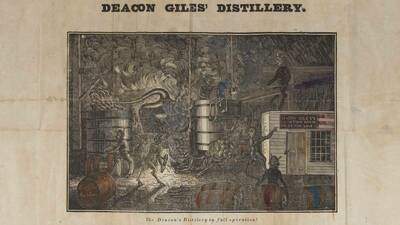Spotlight Exhibit — A Warning Against Rum in Early America
 December January Spotlight
December January Spotlight
This 1835 poster commends a Salem, Massachusetts minister’s attack on a neighbor for distilling and selling rum. Deacon Giles’ Distillery is a thinly-disguised allegory through which clergyman George Cheever (b. 1807) accuses “Deacon Giles” (a local church official) of causing drunkenness, of being a bad-tempered and brutal employer, and a religious hypocrite (he sold Bibles as well as spirits).
Greedy for profit, Deacon Giles fails to notice that he has hired demons to operate his distillery (detail on left side of poster). Although the demons quickly process Giles’ supply of molasses into rum, they also bespell the barrels to display dire warnings – ”Distilled Death and Liquid Damnation,” “Murder and Insanity” — when the first glass is drawn. Spooked sellers and drinkers abandon the casks and Giles must destroy them. The allegory ends with the ominous observation that “his distillery has smelled of brimstone ever since.”
Cheever’s scurrilous story scandalized the Salem community, where the minister's target, Deacon John Stone, was well-liked. He won a libel suit against Cheever that landed him in jail. Despite, or perhaps because of, his legal troubles, Cheever’s parable proved popular, as its distribution as an illustrated poster suggests. Cheever was an active member of the American Temperance Society, a national organization formed in 1826 around concern about Americans' very high alcohol consumption. By attacking an established figure like Stone, the young Cheever probably wanted to make an impression as a firebrand reformer–an effect he certainly achieved.
This particular copy was partially hand-colored in watercolor, preserved with a cloth backing, folded, and bound into a pocket-sized leather cover.
This exhibit is curated by Rachel Bohlmann, American History Librarian and Curator and Interim Head, Rare Books and Special Collections. This and other exhibits within the Hesburgh Libraries are generously supported by the McBrien Special Collections Endowment.
All exhibits are free and open to the public during business hours.
Open to Undergraduates, Graduate Students, Faculty, Staff, Postdocs, Public, Alumni, & Friends.